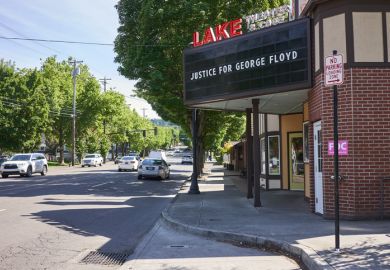Five days after George Floyd was killed by police in Minneapolis, Wayne Frederick, president of Howard University, America’s most prestigious historically black university, published a letter to his staff and students.
“We were born for such a time as this,” he wrote. “And I am convinced that institutions like Howard University are destined to continue to build, mould and train the leaders who will help bring needed change to the structures of our society.”
Howard University, based in Washington DC, is known as “The Mecca” on account of its important role in the civil rights movement. But “that journey is incomplete”, Dr Frederick told Times Higher Education, adding that ever since the start of that movement, Howard has been “trying to ensure that as a society we can complete that journey”.
Is it a burden for the institution to still be tackling this issue?
“It’s certainly not a burden. This is what our mission is about,” Dr Frederick said.
“This [the movement set in motion by the killing of Mr Floyd] just emphasises it for the nation, but it’s not something that we have ever lost sight of or lost focus around…And maybe when we make requests for resources again, more people will see the need and maybe that also helps us as well.”
Howard University has faced particular financial challenges, not least because it also fully owns and runs Howard University Hospital, which provides critical care for low-income, predominantly African American residents.
But Dr Frederick said the institution’s finances have been improving over the past couple of years, while more recently Howard has “received our share of donations” directed at mitigating the disproportionate impact of Covid-19 on black communities.
Dr Frederick’s own research tackles unconscious bias in medicine. African Americans are less likely to be offered life-saving procedures “because they may be more costly and providers may determine that they don’t deserve it”, he said.
He added that there are fewer African American males enrolling in medical school now than there were in 1978, while just 1 per cent of full professors in medicine in the US are black (African Americans comprise 13 per cent of the overall US population).
“All of these things are tied together – they’ve been tied together for some time – and those are the things that must be supported. You have to support an education system that empowers youth regardless of their racial background,” he said.
Dr Frederick added that a key way to ensure that more black academics are appointed professors in the US is to better fund historically black colleges and universities, given that they “represent such an important pipeline”.
“Howard has produced more African American physicians over the course of our entire history than any other single institution,” he said.
But Dr Frederick said he saw universities as “the thinktanks of America” and, as such, he believed that all higher education institutions had to be at the forefront of providing solutions to tackle racism.
Just like during the civil rights movement, students and staff at Howard have been active participants in the current protests.
“These are things that they have been calling out in their work for decades,” Dr Frederick said. “It gives a voice to the work that they’ve been doing all along.”
Are we now at a pivotal moment of change in terms of tackling racism and equality?
“I hope so,” Dr Frederick said.
“It never goes away for the black community, and maybe this time it doesn’t go away for the rest of America until everybody admits that there is an issue and agrees to fix it. I think that that’s critical.”
The recent anti-racism protests that began in the US and have now swept across the world have reignited debates around universities’ own histories and led to renewed calls for statues of imperialists and slave owners to be removed.
Dr Frederick said he was “hesitant” to give advice in this regard, noting that there was not a one-size-fits-all answer to the issue, but he said universities had to accept that “some of these histories that we have told have been incomplete”.
“Our country not only has embellished some of the participation of those [white] figures, but it has also lessened the impact of African American figures,” he said.
“Taking down monuments and names is one aspect of it, but I hope at the same time there’s just as much energy and willingness [to tell] the stories of the black participants who have been forgotten or left behind in this discussion.”
ellie.bothwell@timeshighereducation.com
Dr Frederick will be part of our webinar panel, THE in Conversation: confronting racism in universities, on 19 June at 2pm BST/ 9am EST. Register for free to join the discussion.
Register to continue
Why register?
- Registration is free and only takes a moment
- Once registered, you can read 3 articles a month
- Sign up for our newsletter
Subscribe
Or subscribe for unlimited access to:
- Unlimited access to news, views, insights & reviews
- Digital editions
- Digital access to THE’s university and college rankings analysis
Already registered or a current subscriber?








